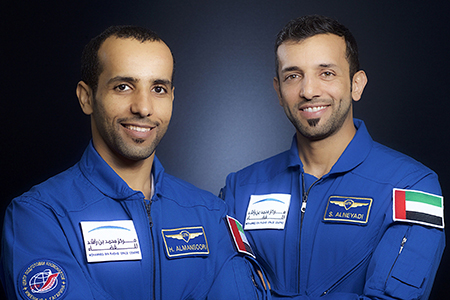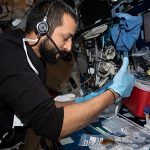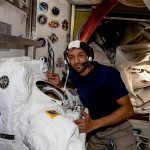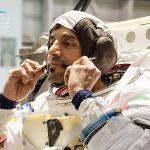AlMansoori will be the point of contact between the ground team and the ISS crew during real-time operations of Expedition 69.

Photo credit: WAM
Emirati astronaut Hazzaa AlMansoori has become the first Arab appointed as an increment lead on the International Space Station, according to a report by WAM.
Following the undocking of the Soyuz MS-22 spacecraft on 28th March, the historic Expedition 69 is officially underway. The commencement of the mission marks a significant milestone for the Arab region and the UAE.
In his role as lead, AlMansoori will guide the ISS crew through every aspect of the mission, underscoring the UAEs expanding contribution to the field of space exploration.
As part of Expedition 69’s mission, the Emirati astronaut AlNeyadi will lead a variety of experiments, including researching how microgravity affects material combustion to enhance spacecraft safety, testing a novel tool for deep-space immune monitoring, and evaluating human cardiac function in microgravity with 3D-cultured cardiac muscle tissue. Additionally, AlNeyadi will test samples for microorganisms from outside of the space station.
In his role as Increment Lead, AlMansoori shoulders a critical responsibility for the seamless integration and execution of ISS crew activities throughout Expedition 69. This involves an array of duties, such as developing, managing, implementing, and communicating mission integration procedures. Leveraging his skills and expertise, Al Mansoori will ensure the missions efficiency and effectiveness by serving as the primary point of contact between the ground team and the ISS crew during real-time operations.
Salem Humaid Al Marri, Director General of Mohammed Bin Rashid Space Centre (MBRSC), said: The Expedition 69 mission is a tremendous accomplishment for the UAE and the entire Arab region. It represents the longest Arab space mission to date and marks the first time an Arab astronaut has been appointed as Increment Lead. Hazzaa AlMansooris appointment to this position is a testament to his exceptional skills and knowledge, and it sets the stage for more Arab astronauts to participate in space exploration. We are excited to witness Sultan and Hazzaa collaborate to conduct ground-breaking experiments that will broaden our knowledge of space and understanding of life in microgravity.
Astronaut Hazzaa AlMansoori added: I am honoured to facilitate seamless information exchange between the Astronauts Office and the ISS Expedition team. However, my role entails more than just transmitting data. It includes understanding and appreciating our crews challenges and triumphs in space. We aim to advance human space exploration through our collective efforts to support Expedition 69.
AlNeyadi has begun conducting experiments with the BioFabrication Facility, evaluating its capacity to produce knee cartilage tissue for treating injuries in space and remote locations on Earth. He also underwent neck, shoulder, and leg vein scans using the Ultrasound 2 medical device.
Expedition 69 crew aboard the ISS comprises astronauts Sultan AlNeyadi, Stephen Bowen, Woody Hoburg, Frank Rubio, Dmitri Petelin, Sergey Prokopyev, and Andrey Fedyaev. The completion of this six-month mission will make a substantial contribution to the UAEs knowledge of space and set the stage for future human space exploration.















































































